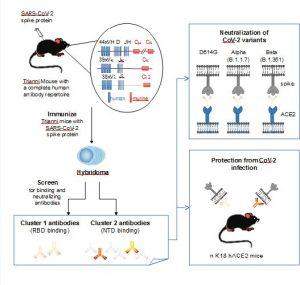The emergence of immune escape variants of SARS-CoV-2 virus is a serious concern. Immune escape may have contributed to the emergence of new SARS-CoV-2 variants and to the loss of vaccine efficacy. More targeted vaccine approaches employing structure-based designs of spike vaccines against emerging variant of concerns and a reliable animal model with a human immunoglobulin gene repertoire is therefore needed for better pandemic preparedness and optimization of vaccine antigens against emerging SARS-CoV-2 variants (READ MORE).
Hans-Martin et al reported the isolation of monoclonal antibodies from TRIANNI mice, mice carrying an entire set of human immunoglobulin V region gene segments (Figure 1). These monoclonal antibodies can be used to target the RBD or the NTD of the spike protein of SARS-CoV-2, providing a pair of non-competing human monoclonal antibodies for clinical development.

Figure 1: Transgenic mice with a complete human antibody repertoire (Trianni platform) were immunized with the spike protein (S protein) of SARS-CoV-2 and hybridoma clones were established. Two clusters of clonally related SARS-CoV-2-neutralizing monoclonal antibodies were isolated. Cluster 1 binds to the N-terminal domain (NTD) and Cluster 2 to the receptor-binding domain (RBD) of the CoV-2 spike protein. The antibodies also significantly reduce the viral spread in hACE2-transgenic mice (Peters, et al., 2022).
The researchers successfully identified a total of 29 hybridomas that secreted spike protein binding antibodies that outcompeted with hACE2. They were designated TRES antibodies (TRIANNI-Erlangen anti-SARS-CoV-2- Spike). Further characterization of these antibodies led to the identification of two clusters: cluster 1 (TRES6, TRES 224, and TRES 567) which displayed neutralizing activity against the receptor binding domain (RBD) and cluster 2 (TRES49, TRES 219, TRES 328, TRES 618, TRES 1209 and TRES 1293) which displayed neutralizing activity against the N-terminal domain (NTD) of the wild type virus. However, only cluster 1 antibodies showed neutralizing activity when tested against two emerging SARS-CoV-2 variants of concern [(Alpha (B.1.1.7) and Beta (B.1.351)]. Additionally, cluster 1 antibody TRES6, and cluster 2 antibodies TRES328, confer protection from disease in a murine challenge model.
Journal article: Peter, A.S., et al., 2022. A pair of non-competing neutralizing human monoclonal antibodies protecting from disease in a SARS-CoV-2 infection model. European Journal of Immunology
Summary by Amana Bokagne










